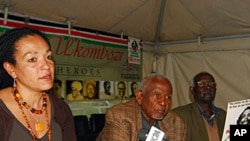The acting chairman of the Kenya National Commission on Human Rights said his agency is committed to protecting the rights of all Kenyans.
But, Samuel Tororei said, while every Kenyan has the right to free speech, the exercise of such a right cannot be at the expense of other Kenyans.
His comments came as three Kenyan musicians await trial after being charged with hate speech under new laws adopted following the country’s post-election violence in 2008.
The National Cohesion and Integration Commission said the musicians’ songs were intended to cause hatred and hostility between the country’s Kikuyu and Luo ethnic groups.
Acting chairman Tororei said his commission awaits the court’s ruling on the issue.
“For the Kenya National Commission for Human Rights, our brief is to ensure that whatever actions we take are within the purview that allows the maximum enjoyment of human rights. But remember, that enjoying human rights entails on a citizen, whether private or corporate, the duty, the responsibility to respect other people’s rights, too. So, provided that that generally agrees we will just keep watch and see how the court handles the issue,” he said.
Kenya’s National Cohesion and Integration Commission said songs by musician Kamande wa Kioi, Muigai Wa Njoroge and John DeMathew promoted hate speech by belittling rivals of deputy prime minister Uhuru Kenyatta, whose ethnicity is Luo.
Tororei said the music would qualify as political expression protected by free speech only if the court determines it to be.
“In the meantime, what the National Cohesion and Integration Commission is doing is to test that paradigm. Does it meet the threshold of hate speech or can it be construed to be just a political expression paid for and supported for a favorite candidate? Where is the boundary?” Tororei said.
Widespread violence after the 2008 disputed presidential election killed an estimated 1,300 Kenyans and displaced about 300,000.
The National Cohesion and Integration Commission was established in 2008 to promote harmony among Kenyans in hopes of preventing outbreaks of ethnic violence.
Tororei said, although the Kenyan constitution protects free speech, it is also necessary for the nation to be on its guard to prevent violence.
“We have come through a difficult path in our history and that difficult path has, by and large, also contributed to fairly intrusive, negative expressions of stereotypes and such things. And so, it is necessary that we are on our guard. And we cannot belittle the danger of allowing misuse of free speech,” Tororei said.
He said it should be seen as a fact of maturity the fact that Kenyans are taking each other to court for arbitration whenever they disagree.
“So, for us we don’t see any contradiction. We would, of course, speak out if the charges were seen to be frivolous, if the charges were seen to be unnecessarily intrusive into the character of those accused because even the accused have rights. But, I want to restate again that every right comes with responsibility,” Tororei said.
But, Samuel Tororei said, while every Kenyan has the right to free speech, the exercise of such a right cannot be at the expense of other Kenyans.
His comments came as three Kenyan musicians await trial after being charged with hate speech under new laws adopted following the country’s post-election violence in 2008.
The National Cohesion and Integration Commission said the musicians’ songs were intended to cause hatred and hostility between the country’s Kikuyu and Luo ethnic groups.
Acting chairman Tororei said his commission awaits the court’s ruling on the issue.
“For the Kenya National Commission for Human Rights, our brief is to ensure that whatever actions we take are within the purview that allows the maximum enjoyment of human rights. But remember, that enjoying human rights entails on a citizen, whether private or corporate, the duty, the responsibility to respect other people’s rights, too. So, provided that that generally agrees we will just keep watch and see how the court handles the issue,” he said.
Kenya’s National Cohesion and Integration Commission said songs by musician Kamande wa Kioi, Muigai Wa Njoroge and John DeMathew promoted hate speech by belittling rivals of deputy prime minister Uhuru Kenyatta, whose ethnicity is Luo.
Tororei said the music would qualify as political expression protected by free speech only if the court determines it to be.
“In the meantime, what the National Cohesion and Integration Commission is doing is to test that paradigm. Does it meet the threshold of hate speech or can it be construed to be just a political expression paid for and supported for a favorite candidate? Where is the boundary?” Tororei said.
Widespread violence after the 2008 disputed presidential election killed an estimated 1,300 Kenyans and displaced about 300,000.
The National Cohesion and Integration Commission was established in 2008 to promote harmony among Kenyans in hopes of preventing outbreaks of ethnic violence.
Tororei said, although the Kenyan constitution protects free speech, it is also necessary for the nation to be on its guard to prevent violence.
“We have come through a difficult path in our history and that difficult path has, by and large, also contributed to fairly intrusive, negative expressions of stereotypes and such things. And so, it is necessary that we are on our guard. And we cannot belittle the danger of allowing misuse of free speech,” Tororei said.
He said it should be seen as a fact of maturity the fact that Kenyans are taking each other to court for arbitration whenever they disagree.
“So, for us we don’t see any contradiction. We would, of course, speak out if the charges were seen to be frivolous, if the charges were seen to be unnecessarily intrusive into the character of those accused because even the accused have rights. But, I want to restate again that every right comes with responsibility,” Tororei said.















